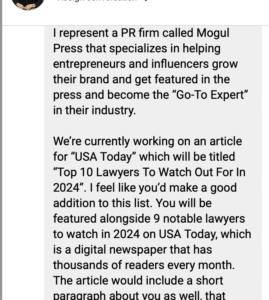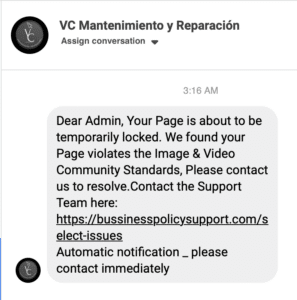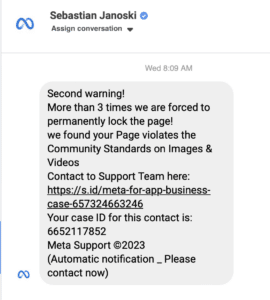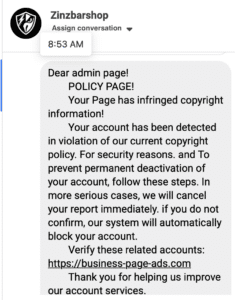3 Facebook Scams Law Firms Should Beware Of
- Brooke Mathieu
In today’s digital age, the number of scams permeating the virtual world has seen a worrying surge. While phone scams and email scams are still very much prevalent, social media scams on Meta are becoming more common and more creative. Facebook, which transitioned under Meta’s banner, is rife with scam artists targeting unsuspecting victims. Like many small businesses law firms have become targets for scammers. The gravity of these scams’ potential implications cannot be understated. Financial losses aside, the reputation and trust cultivated over the years can be tarnished in an instant. Digital platforms offer anonymity, making it easy for scammers to operate with impunity. This is why it’s crucial that you and anyone in charge of your social media accounts are aware of common scams and what you can do to prevent yourself from becoming a victim of social media scammers.
Recognizing Facebook Scams
Facebook, with its billions of users, is a magnet for scam artists. Specifically, Facebook scammers target individuals and businesses through Messenger. They cleverly mask their intentions, by claiming to be someone they’re not or even posing as Facebook or Meta Business Suite employees themselves, making it harder to detect their true identity and intentions. Even the most tech-savvy individuals can fall prey if they’re not constantly vigilant. This is why it is essential to be aware of the different scams out there, knowing what to look out for, and understanding what measures you can implement in order to protect your business and/or personal account.
Common Scams
Scammers have weaponized Messenger’s popularity as a way to target businesses and individuals. Some more common scams you may have seen through Messenger involve leveraging the appeal of brand endorsements or dangling the lure of unexpected financial gains. Generally, anytime someone is offering you money or an unexpected brand endorsement this should be a red flag. You can take it a step further by going to the sender’s account and looking at their activity as well as who their friends and followers are. While some senders may appear to have a normal following, you should look at who is following them, what you’ll most likely notice it is bot followers or many overseas followers. It’s best to ignore accounts like these and keep consistent internal communication on new scams to serve as an early warning system.

USA Today Scams
Recognition in esteemed publications is a significant accolade for any professional. But with entities like “PR Mogul” peddling seemingly easy pathways to such honors, one must tread carefully. All of our own law firms have been hit with similar DMs claiming we can secure a spot as a “Top 10 Lawyer” on USA today or the New York Journal. Here’s the thing, public relations firms can purchase a spot in a magazine and create and publish an article on their behalf. To be clear, USA Today and The New York Journal are not trying to scam you, but some unreputable PR firms might be. Any attorney can be a “Top 10 Lawyer” in a reputable publication if they’re willing to pay for it, this doesn’t necessarily mean it’s true. Working with a reputable marketing agency or PR firm that has direct communication with publications can mitigate these risks.

Copyright and Temporarily Suspended Facebook Account Scams
The digital space, vibrant with content and AI tools, is a battleground for copyright claims. Scammers exploit this, sending ominous messages of infringements and impending legal actions. An internal team or contact focused on copyrights can be invaluable for law firms. They can quickly verify and address any genuine concerns while dismissing fraudulent claims.
Additionally, another common fear tactic scammers use can be making claims that your account may temporarily be suspended or even be deleted. Few things induce digital panic like the prospect of losing access to one’s social media account. This fear is what scammers bank on when dispatching notifications of account suspensions. Often they’ll try to take you to a link to confirm your login or to login to see why your account is facing suspension. This is how they capture your login information. Messages like this should be reported, ignored, and deleted from your inbox. Additionally, a direct line of communication with Facebook’s support team can alleviate such concerns.



How to Report Scams
Scams on Meta are becoming more common and Meta is doing their best to combat the rampant scam issue. While they can’t always immediately identify every suspicious account that is created, they have put forth tools and mechanisms for users to report suspicious activities and accounts. Reporting suspicious accounts is critical in helping to stop scammers in their tracks. Being proactive, not just in reporting but also in following up, ensures these issues gain the attention they deserve and malicious accounts are being removed from Meta. Collective reporting from multiple victims can often expedite platform responses and prevent others from falling victim to various spams.
What to do if Your Facebook Account Has Been Hacked
If you’ve fallen victim of a Facebook scam or your account has been hacked, take a deep breath. You’re not the first person that this has happened to and unfortunately you won’t be the last. One of the biggest challenges with a hacked account on Meta is there is only so much their support team can do. While you should report your hacked account to Meta and try everything in your power to get your existing account back, it’s also important to know when to talk away. It’s okay to start a new account. We’ve experienced this before with some of our own clients and after several months of no resolution, it was time to start over. While you will have to start over it’s better than going around in circles with Meta support and losing access to a valuable channel.
How to Avoid Facebook Scams and Spams
Preventative measures are a law firm’s best defense against the pervasive threat of scams. Activating enhanced security protocols, maintaining a rigorous verification routine, and continuous education on the evolving nature of scams can make all the difference. Keeping yourself educated on what’s happening with Meta, especially concerning security breaches or new scam tactics, can further fortify a firm’s defenses. Investing in cybersecurity infrastructure and training can be helpful for law firm’s. Two-factor authentication can also help you better protect your personal information.
The digitization of our world, while bringing unparalleled benefits, has also brought in new challenges. Law firms, due to their stature and the nature of their work, are lucrative targets for scammers. As these scams evolve in complexity, staying several steps ahead becomes not just beneficial but essential. With a harmonious blend of technology, education, and vigilance, law firms can navigate the digital realm securely and confidently. Each challenge faced also presents an opportunity for growth and fortification. Firms that prioritize cybersecurity will not only protect their assets but also gain the trust and confidence of their clients. Additionally, trusting your firm’s social accounts with a trusted marketing agency or PR firm can add an extra layer of security as these individuals are continuously educating themselves on matters such as this.


